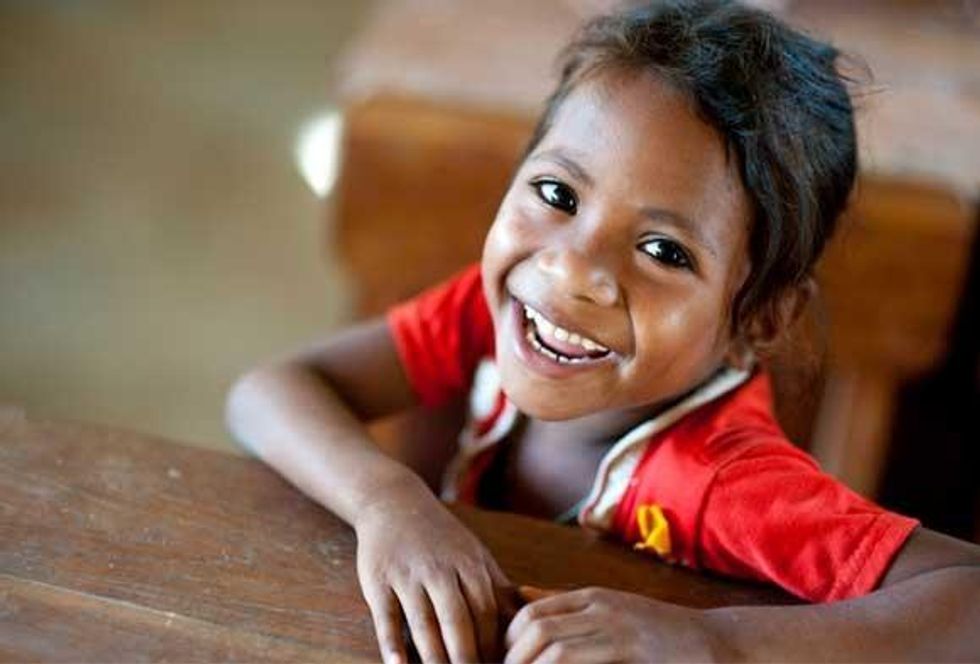Today is our human family's first-ever International Day of the Girl.
This is a day to celebrate the fact that it is girls who will change the world; that the empowerment of girls holds the key to development and security for families, communities and societies worldwide. It also recognizes the discrimination and violence that girls disproportionately endure -- and it is especially important that one of the cruelest hardships to befall girls, child marriage, should be the UN's chosen theme for this inaugural day.
The marriage of adolescent girls, sometimes to much older men, sums up much of the harm, injustice and stolen potential that afflict so many girls around the world.
Ten million girls under the age of 18 are married off, every year, with little or no say in the matter. That's 100 million girls in the next decade. Their parents may feel they are doing the right thing to protect their daughters, but in reality these brides will be vulnerable to ill health, violence, inadequate education and poverty -- as will their children.
Imagine, instead, the wonderful force we would unleash if these girls could be spared such a life.
They would be more likely to stay in school. Studies have shown that when girls stay longer in primary school, they earn wages up to 10 to 20 percent higher in their adult lives. As they get older, the differences in earnings are even more encouraging: For every extra year in secondary school, they can earn up to 25 percent more in adulthood.
These girls would also be more likely to be healthy, and less likely to contract diseases such as HIV/AIDS than married girls of the same age. And when a woman does eventually start a family, again experts have shown the benefit of having enjoyed a healthy, educated and safe childhood: Rates of maternal and child mortality are also improved by better education, while there are also likely to be happier relations between husband and wife and within the family. What is more, women reinvest more money into their family than men do -- so everyone benefits from the higher earnings.
And we know, having seen it first-hand in successful efforts to reduce child marriage, that these women won't let their daughters marry as children. Child marriage could cease to exist with their generation.
Today, we have the opportunity to enshrine such a global pledge to end child marriage.
The Millennium Development Goals (MDGs), international targets set at the turn of the century, proved it was possible to think, and to act, on the largest of scales: halving extreme poverty, halting the spread of HIV/AIDS and providing universal primary education are some of its objectives, all by the target date of 2015. Unlike many international commitments, the MDGs are still remembered years later, and helped galvanize unprecedented efforts by governments.
Important progress has been made towards meeting the MDGs: For instance, the target of halving the proportion of people without reliable access to improved drinking water has already been met, and primary school enrolment of girls has equaled that of boys. Overall the MDGs have made a historic contribution towards reducing poverty.
But this progress will be stunted if we fail to address injustices as staggering, persistent and widespread as child marriage. As our leaders begin the process of preparing new development goals to succeed the MDGs, the persistence of child marriage should be seen as one of the major barriers to the well-being of our human family.
Too often, child marriage is justified on the basis of custom or tradition. While traditions often serve to bind societies together, we also want to point out that traditions are man-made. If we learn that they are harmful, we should change them.
In our travels, as Elders, in Asia and Africa, we have met brave girls -- and boys -- who do not hesitate to stand up to tradition and say no to child marriage. In Bihar, a state in northeast India where nearly 70 percent of girls marry before they turn 18 (contrary to national law), we met admirable young people who were signing pledges not to marry before 18. In Amhara, a region in northern Ethiopia, where the most common age for a girl to marry is 12, we visited girls who participated in workshops to discuss collectively the benefits of ending child marriage.
These meetings have convinced us that there is a real need to connect groups around the world, enable them to work together and help to end this practice for the benefit of us all. This led to the creation, last year, of Girls Not Brides, a global partnership of organizations dedicated to stopping the practice, with a membership now growing in the hundreds.
Day after day, the voices of these girls and boys continue to rise higher up the international agenda. We believe that an international consensus on the need to end child marriage is within sight.
When we created Girls Not Brides in 2011, we committed to ending child marriage in one generation. Why not, then, pledge the elimination of this harmful practice by 2030?
Development targets to improve global health, education and gender equality would also be directly tackled by a pledge to end this devastating practice.
And generation after generation, girls would be able to fulfill their potential, amplify the benefits bestowed upon them by their own mothers -- and bless their daughters to do the same.
On this inaugural Day of the Girl, we call on the international community to promise a different life to those girls -- a life of their choosing.


